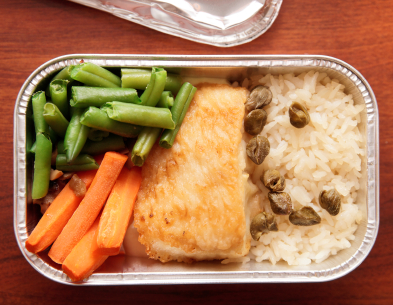 Airplane travel presents some unique nutritional challenges for the youth athlete trying to maintain a diet high in carbohydrates and fluids, moderate in protein and low in fat:
Airplane travel presents some unique nutritional challenges for the youth athlete trying to maintain a diet high in carbohydrates and fluids, moderate in protein and low in fat:
-
Dehydration. The pressurization of the cabin air increases fluid losses, so dehydration can be a problem when the flight lasts several hours or longer. In fact, dehydration is thought to contribute to jetlag. Consuming beverages containing caffeine increases the risk of dehydration because of the diuretic nature of such beverages. The athlete should ingest plenty of water, sports drinks, and fruit juices to replace fluid losses.
-
High fat meals. Airlines do not always provide low-fat meals. However, low-fat or vegetarian meals are often available when requested in advance. Athletes can also bring high-carbohydrate, low-fat snacks with them on the plane. If a meal is not provided on the plane, airport concession stands provide some healthy snacks such as soft pretzels, popcorn (without butter), bagels, fruit/vegetable plates, juice, and frozen yogurt. Most airports also have family-style and fast-food restaurants can also be places serving nutritious meals.
Foreign Travel Nutrition
Depending upon the destination, most athletes who travel internationally have difficulty finding enough food, and are concerned about food-borne illness. Athletes who travel internationally have a 50% chance of contracting travelers' diarrhea that sometimes requires medical attention, and typically causes discomfort, concern, and dehydration. Bacterial infection of the intestinal tract occurs because of inadequate health standards for food and water in some countries, and because athletes have not had the chance to develop immunity to pathogens in regions where they are competing.
Precautionary measures can be taken to protect against disease-causing organisms not found at home. Here are some suggestions:- Drink only bottled water (even if brushing teeth)
- Avoid swallowing shower water
- Do not use ice cubes made from the local water supply
- Get restaurant recommendations from the U.S. Embassy, hotel managers, from coaches and athletes who have previously been in the area, and online (ie. TripAdvisor etc.).
- Stick to familiar foods
- Choose well-cooked foods
- Avoid milk and milk products (because they require pasteurization and refrigeration)
- Eat fruit that can be peeled (bananas, oranges, grapefruits, mangoes, kiwi),
- Avoid salads and other uncooked foods that come in direct contact with the hands of the kitchen staff.
Foods To Take
Your child or team might also want to pack foods to take along on the trip. Some suggestions for non-perishable items include:
- Bread sticks
- Canned fruit/fruit juices, tuna, chicken, soups, baked beans
- Cold cereals
- Crackers
- Dried fruit
- Fig bars
- Granola and breakfast bars
- Oatmeal
- Peanut butter
- Popcorn (microwave)
- Pretzels
- Gelatin packages









